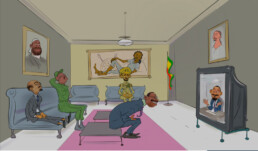The West has long seen African political development through a myopic lens of self-interest and suspicion. A fact made all the more evident in how Western governments, and their media, frame African political development; be it transition or turmoil. Political upheavals and security deterioration in countries like Libya and Somalia are often discussed within the scope of migration, or the socioeconomic threat they pose to the West. While self-interest at the core of Western diplomacy is not inherently harmful to African States, the conflict in Ethiopia’s Tigray region elucidates the potential dangers of Western partisanship in Africa’s political development. In the case of Ethiopia, we have witnessed coercive diplomacy through individual sanctions by states outside of the multilateral framework.
Since the onset of conflict prompted by attacks on military stations in Ethiopia’s Tigray region on November 4th, 2020, the United States and the European Union have adopted a strategy of consistent pressure on the Ethiopian government and sought partners in the Horn Region to find a solution to the crisis. The mainstream media, including those under the congressionally funded Corporation of Public Broadcasting (CPB), news publications (Washington Post, Reuters, the Economist, Foreign Policy) as well as notable human rights watchdogs like Amnesty International have all followed suit.
These strategies have also led to the emergence of a parallel narrative of the conflict
Ethiopians, citizens and officials alike, have spent the better part of a year addressing accusations levied against the nation primarily from the United States, Europe, the mainstream media, as well as international agencies, notably UNDP, WFP, and UN Women that that have persistently called for a cessation of hostilities on humanitarian grounds. While many claim that the West harbors a nefarious plot to weaken Ethiopia’s central government, others maintain that there is simply an ignorance of the facts on the ground.
While the motivation of the United States and the European Union requires closer scrutiny, it is important to identify recurring strategies Western powers and media employed that have prolonged the conflict and increased human suffering in Tigray and neighboring Amhara and Afar regions. These strategies have also led to the emergence of a parallel narrative of the conflict. Hence, instead of further entrenchment into the cyclical pattern of offense and defense pattern, let us examine recurring themes in the West’s framing of Ethiopia’s Tigray crisis.
In identifying recurring themes in the west’s approach to the conflict, ordinary people as well as government officials will break away from the unproductive cycle of offense and defense.
Deny, Deny, Deny
Since the onset of conflict in November of 2020, the question of “who initiated the war” has grown increasingly vague. Though high-ranking TPLF officials like Sekoture Getachew, Getachew Reda, and General Tsadkan Gebretensae, have not only declared their role in initiating hostilities but have also professed their opposition of the governing party and stood in opposition of the continued statehood of Ethiopia; a disclosure that has caused public confusion and turmoil domestically. Inquiries as to “who initiated the war” would have been a laughing matter in the early days of November 2020. However- the global media machinery, as well as Western powers have effectively muddied the waters in their endeavor to rationalize TPLFs motivations in not only initiating the conflict but also prolonging it. The United States, and most notably Ireland, seem to have tabled this important detail in their crusade for humanitarian access.
This is only the start of a series of denials that have baffled the Ethiopian public. Though the likes of the Associated Press and the New York Times have produced sensational pieces on details like recruitment of child soldiers and potential combatants in UN refugees camps in Sudan,
there is barely an acknowledgment of the use of child soldiers, or UN Refugee Agency arguably abetting combatants. Equally, after the Government’s announcement of a unilateral withdrawal. Many in the international community seem oblivious to TPLF’s incursions into Afar and Amhara regions. We have, instead, seen the use of vague terminology like “expansion of the war” to imply further culpability of the Federal Government.
Deflect
Owing to the public outcry on social media platforms, the United States has sought to rationalize some of TPLF’s actions as a response to “a siege”. Criticism for the diverting aid materials for recruitment, use of child soldiers, and guerilla-style attacks on innocent neighboring communities have all been attributed to the Federal Government’s refusal to open its borders. This refusal to acknowledge TPLF crimes, while magnifying the Federal Government’s legitimate measures, is designed to further exacerbate the war and keep the public in a perpetual blame game.

Delegitimize
Minimizing the undisputed legitimacy of the ruling government, the United States and the EU have levied all their accusations at the foot of a single individual, the Prime Minister. The United States and many EU states are yet to acknowledge Ethiopia’s relatively free and fair elections in June of 2021; it is likely for this reason that they continue to seek partners in the region without meaningfully engaging the elected government of Ethiopia. . Additionally, there is a marked shift toward a cold-war era dynamic where the Tigray conflict is discussed within the scope of a Chinese expansion or the growing influence of Russia in East Africa. Secondly, deliberate tarnishing of Ethiopian institutions like the ENDF, the Office of the Prime Minister, and Ethiopia’s Human Rights Commission is yet another attempt to Delegitimize the Government of Ethiopia.
Disinform
The unilateral withdrawal of federal troops is a noteworthy incident of deliberate disinformation. Following the West’s outcry for cessation of hostilities, the withdrawal of federal troops was depicted in one of two ways. First, that the central government was severely weakened to carry out military activities. And second, that withdrawal of federal forces is a de facto siege imposed on the Tigray Region; thereby justifying TPLFs operations in Afar and Amhara regions. This deliberate change in narrative angered the Ethiopian public as it conveniently masks the plight of over two million victims of TPLF violence in the Amhara and Afar regions. The United States embassy in Addis Ababa is yet another actor that continues to disseminate unsubstantiated reporting on the nation’s safety and security which only serves to stoke panic.
So, why is it important to identify these deliberate strategies deployed by Western powers and their media machinery? First, the people need to regain their voice in a conflict where many claim to speak on the Ethiopian People’s behalf. In identifying recurring themes in the west’s approach to the conflict, ordinary people as well as government officials can break away from the unproductive cycle of offense and defense. Instead, the nation can collectively move toward a much-needed national dialogue rooted in firm principles: both of the Ethiopian legal code as well as customary international law.
Secondly, instead of rectifying factually inaccurate international reporting and levying accusations on foreign governments, the Ethiopian public needs to hold its own elected officials responsible, including demands for increased access to information and greater transparency.
Ethiopian leadership through the ages. Confronting or conforming to the past?

